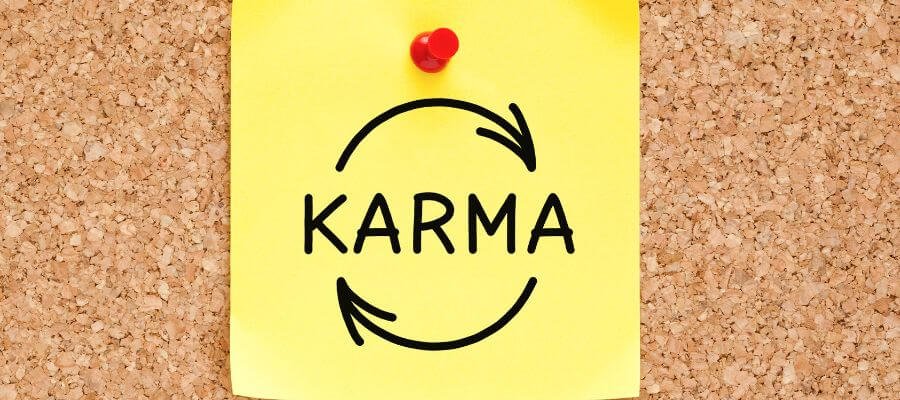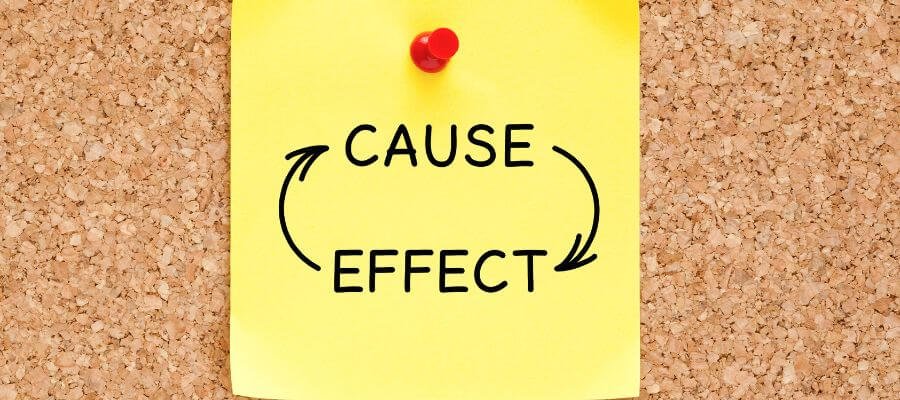In this world of suffering, we are shaped by our actions, whether they are good or bad. Everything we do, think, and see is governed by the law of karma, which dictates that we receive what we give. This principle is often summarized by the saying “as you sow, so shall you reap.”
Karma is a concept deeply rooted in Buddhist philosophy and Indian religions. It refers to the consequences of our past actions, which can carry over from previous lives. Our own karma, whether it is good or bad, influences our future life experiences.
Karma is not limited to human beings but also applies to supernatural beings and other living beings. It is believed that every intentional action, whether good or evil, creates a karmic imprint that will have an impact on one’s life. Negative consequences can be the result of evil acts, while positive outcomes can be attributed to good deeds.

The term karma is often associated with religious principles and Indian philosophy. It is a central concept in the Buddhist doctrine and is intricately woven into the fabric of life. The endless knot symbolizes the interconnectedness of karma, where one’s actions affect not only themselves but also others.
In summary, karma is the universal law of cause and effect, where our own actions shape our present and future lives. It serves as a reminder to be mindful of our intentions and actions, as they can have far-reaching consequences.
Karma and the law of sowing what we reap
Depending on your actions, you will reap what you sow. If you do good and give sound to the world, the same is bound to return to you in some way or another. But if you end up doing wrong to others, you know it will come around sometime or another. That is why it is essential to watch all our actions before we perform them.
For starters, whatever we say and do plays a significant role in analysing how our karmic actions will be. Although people think that they have gotten away with their crime, it never indeed does. Even if it takes ten years, Karma will come back from somewhere or another to teach you the lesson you need to learn.
Often, when something wrong happens in our lives, we have a habit of blaming destiny and our lives. Little do we know, it is the consequence of our karmic actions. Until our karmic account gets resolved, life will keep bringing pain and suffering to us. The littlest things that we do today to hurt people or ourselves or any other thing around us have a habit of returning in unexpected ways. But often, people associate Karma not only with the present world but also with the afterlife. They believe that the karmic account will continue even in the afterlife.

Karma and Reincarnation
The concept of karma is closely intertwined with reincarnation. It is believed that we are reborn again and again, and each time we are reborn, the effects of our previous actions continue with us. If we have done good in our past lives, our current life will be filled with happiness and blessings. However, if we have done bad, the consequences of our actions will catch up with us in this life or the next. Therefore, it is crucial to understand that we are not just living for this life, but also for our future rebirth. Our actions in this life will ultimately determine our fate in the next.

How to break free from negative karma
The law of karma can be a source of great suffering and pain when we are faced with its consequences. However, there are ways to break free from negative karma and create a more positive future for ourselves. One way is by practicing good deeds and performing selfless acts of kindness, which can help balance out negative karma. Another way is through mindfulness and self-awareness, where we think before we act and strive to live in alignment with the principles of compassion and non-harming. By doing so, we can create a better future for ourselves and those around us.
Remember, what goes around comes around – so let us strive to spread positivity and kindness in this world. So, always be mindful of your actions and the intentions behind them. Because ultimately, karma will come back around, and we are the ones who have the power to shape our lives for better or worse. Let us choose wisely and create a positive ripple effect in this
Karma and Self-Awareness
Understanding the concept of karma also brings self-awareness in our actions. Karma, often called the word karman, is a belief present in Buddhism and Hinduism. It refers to the inevitable result of a person’s actions, whether they are good or bad. It is believed that karma is linked to a person’s past lives and will also affect their future lives. Good karma is the result of good acts, while bad karma is the result of bad deeds or evil actions.
Karma is often represented by the symbol of the endless knot, which signifies the interconnectedness of a person’s actions and their consequences. It reminds us that our actions have a direct impact on our own life as well as on the lives of others.
In the first stage of karma, called vedaniya karma, the nature of a person’s actions determines the rewards or negative results they will receive. It is believed that karma is not limited to human beings alone, but also applies to other forms of souls.
For example, if a person performs good actions in their life, they are likely to receive positive rewards in the future, either in the same life or in the next life. On the other hand, if a person engages in bad actions, they may face negative consequences in the form of suffering or even die young.
It is important to note that karma is not a punishment or reward system imposed by an external force, but rather a natural law that governs the consequences of human actions. It provides individuals with the possibility to make choices and take responsibility for their own actions.

Past karma, present and our future
People believe that the law of Karma cause and effect never stop until we change our lives completely. Every good thing will be rewarded and every evil thing punished. Even in our afterlife, God counts the deeds and gives a final verdict of where we need to be according to our karmas. The good ones go to heaven and the bad ones to hell. That is why Bhagavad Gita specifies the laws of Karma. It also teaches people to take responsibility for their actions and stop blaming others. To sum up, each of your previous lives subsequently results in your present life. That is why people need to change themselves from this very minute to schedule their karmic account in the right direction.
Many times, even good people tend to think that they have not done wrong to others then why is bad coming to them. That is when they start to believe in destiny. But the laws of Karma never change for anyone. Although they may be good today until their karmic accounts are resolved, they will continue to suffer. It is also believed that we are born to improve our karmas and resolve our karmic account as far as possible in each life. That is why simple changes in our daily living can change our lives and help resolve our karmic cycle.

What is Bad Karma?
Karma is the belief that our actions have inevitable consequences, whether positive or negative. It is often referred to as “good karma” or “bad karma” depending on the nature of our actions. In Hinduism and Buddhism, it is believed that karma carries over from one life to the next, impacting our future experiences. For example, if someone commits an evil act, it is said to be their bad karma, and it may result in negative outcomes in their life.
The word “karma” is derived from the Sanskrit word “karman,” which means “action” or “deed.” It is believed that our actions create a chain of cause and effect, known as the law of karma. This law states that our current actions will have consequences in the future, whether in this life or the next.
In Buddhism, there are different types of karma, such as “gotra karma” and “vedaniya karma,” which influence different aspects of a person’s life. The effects of karma can be seen in various ways, such as the possibility of a person dying young or experiencing negative results due to their past actions.
Karma is not limited to specific traditions and is recognized in various cultures and religions. It serves as a reminder to consider the consequences of our actions and to strive for good acts. Ultimately, karma teaches us that our actions have an impact on our lives and the lives of others, creating an interconnected web of cause and effect.
What is Good Karma?
Karma is the result of our actions, with positive or negative consequences. It can bring happiness, peace, and prosperity to our lives. Good karma is formed through good deeds, kind words, and compassionate actions. On the other hand, bad karma is the result of evil deeds, negative actions, and harmful intentions. Karma refers to the accumulation of these actions and their impact on our present and future lives.
In the concept of karma, it is believed that our actions in past lives can influence our current life and future lives. This is often referred to as past karma or previous lives. The idea is that our actions in past lives can shape our circumstances and experiences in the present.
It is important to understand that karma is not just limited to human beings. Every living being, including animals, can accumulate karma through their actions. The concept of karma recognizes that every action has consequences, and these consequences can be positive or negative.
Karma is often symbolized by the endless knot, representing the interconnectedness of our actions and their effects. It is believed that by doing good deeds and spreading positivity, we can create fresh karma that will have positive consequences in our lives.
However, it is important to note that karma is not a form of punishment or reward. It simply refers to the cause and effect relationship between our actions and their consequences. Good or bad karma is not determined by an external force, but rather by our own actions and intentions.
In summary, karma is a concept that recognizes the impact of our actions on our lives. By understanding the concept of karma and practicing good deeds, we can create positive energy and improve our present and future lives. So, let’s strive to do good deeds, spread positivity, and make the world a better place.
Resolve your karmic account today
Resolve your karmic account today and unlock the path to a better future. It all starts with a shift in perspective. Instead of judging others, focus on self-reflection. By doing so, you avoid accumulating bad karma associated with negative thoughts. Remember, the way we think of others can come back to us in the same way. Embrace honesty and kindness towards everyone you encounter. When you do good deeds, you pave the way for good karma to flow back into your life.
Acknowledge your mistakes, reject wrongdoing, and embrace what is right. This mindful approach helps you break free from the cycle of negative consequences and allows you to learn from past lives. Karma is not to be feared; it is an opportunity for growth and inspiration. The laws of karma exist to guide us and prevent us from repeating the mistakes of our past. As you clear your karmic debts, you create space for positive actions and experiences. With each step, you come closer to achieving salvation from the suffering of this mortal world. So, why wait? Start the journey of resolving your karma today and witness the transformative power it holds.





























